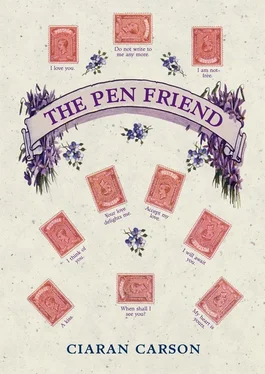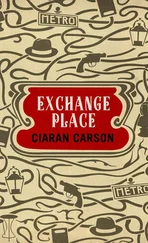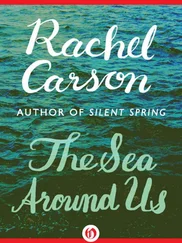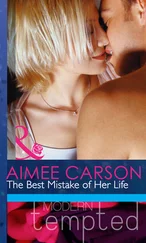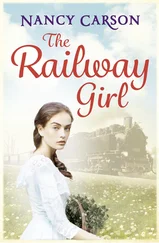And you shook your head sadly, and said, No, Gabriel, it won’t be like that, I’ve changed since then. Is that what I said to you? I can’t remember, it’s such a long time ago, I’ve forgotten so much, you said. Please, Nina, I said, you can’t have changed that much, just be what you were to me then, just a little, just for this one night. And you said, Perhaps I never was that person, Gabriel, perhaps even then you made me up, perhaps you were in love with a dream of me, and not the real me. And then I would remember how you had said that to me in real life. Goodbye, Gabriel, you said, and you stepped back into the shadows, and I would wake with my eyes full of tears.
Last night, inspired by your postcard, I dreamed of you again. The happy dream this time, where we take the Belfast train for New York. Just as you settled in your seat you sprayed a little perfume on your wrists. What’s that? I said. Chamade , you said, by Jean Paul Guerlain, 1969. I always liked the word, it’s after Françoise Sagan’s novel, La Chamade , a double-edged word. Son coeur battait la chamade , her heart was beating wildly. But la chamade is also a drumbeat signalling retreat. And so the dream proceeded as it had before, except when I found you in my bed in Ophir Gardens, my father did not come in, for he has been dead these seven years. And you were about to surrender to me when I really did wake. You were not there, but it seemed to me your perfume lingered on the pillow for a good half-hour: Spanish lilac, hyacinth and tuberose, calmed by murmurs of amber, jasmine, lily of the valley. Then a lingering, coffiny base of cedarwood.
Again I find I’m playing catch-up with myself, for I had intended to dwell a little on the fact that your last card, that of Grand Central Terminal, had also been posted in Dublin, and bore a 60c Hawthorn stamp. Again, the face value of the stamp seemed high. It, too, must have been deliberately chosen. In Irish folklore, the hawthorn is the fairy tree, especially a lone hawthorn, for under it you may find a portal to the fairy world which lies contiguous to ours. And I am reminded of your description of your mother’s perfume, Après l’Ondée , hawthorn and violets doused in rain, how perfume can so magically evoke the presence of someone no longer in this world. As for your latest postcard, it’s been posted in Drogheda, with a 65c Bluebell stamp, and I had written a good few sentences in response to that when my pen malfunctioned.
I had only myself to blame. I had recently acquired a Wasp Clipper made in the US in the thirties by Sheaffer, quite a beautiful pen in a layered olive green and silver-grey web pattern shot through with sparkling gold threads that create an illusion of extraordinary depth. But the nib had lost most of its iridium, and was an unsatisfactory, scratchy writer. And I wanted this lovely pen to be a working pen, so I thought I would take the good nib from a Parker pen that had lost its cap, and substitute it for the poor Clipper nib. As it turned out, when I disassembled the two pens and tried out the marriage, it wouldn’t work: the Parker nib was just that much bigger than the Clipper, and I couldn’t get both nib and feed to fit the section. So I rummaged around in my spares box and eventually found an old Conway Stewart feed that was a little narrower than the Parker feed, and tried that, and lo! the combination worked perfectly. I filled up the Wasp Clipper Parker Conway Stewart, and began to write. The line was nice and smooth, if a trifle wet, and I was writing quite pleasurably with my Frankenstein’s monster of a pen when it dried up on me. I shook it, and tried it again; nothing happened, so I shook it little more violently, whereupon it spat out a series of blots across my words.
That marriage wasn’t quite right either: the feed was just that little bit too narrow. I crumpled the ruined page into a ball and binned it, and took up a 1940s Wyvern Perfect Pen in Rose Pearl and Black instead, which I knew to be more reliable. The whole experience made me reflect on my gradual and somewhat reluctant discovery that many vintage pens, considered purely as writing instruments, are far from perfect. Oh, they look beautiful, but they leak, they blot, they flood, they skip, they scratch, or the filler mechanisms don’t work — worst of all is the plunger filler invented by Sweetser, the roller-skating transvestite, which gives all sorts of trouble because it depends on a very precise vacuum seal, and even if you replace a worn seal, you can never trust them to fill satisfactorily again. Whereas a cheap modern cartridge pen by Parker or Sheaffer will last you for years, and write unhesitatingly with a consistent line every time you pick it up.
When I was last in London I bought a Japanese Muji cartridge pen in their Tottenham Court Road shop — it cost just ten pounds — for purposes of comparison with my vintage collection. Any time I’m in London I usually end up buying something there, and I’ve just looked up Muji on the net to remind myself of their products. At the heart of Muji design, says their website, is the Japanese concept of kanketsu , the concept of simplicity … Muji’s simple, anonymous, unostentatious products subtly blend in with their background and bring a quiet sense of calm into strenuous everyday lives . My life is not that strenuous, but I especially like Muji’s stationery range — steel rulers, mini tape-measures, acrylic hole punches, brightly coloured paper clips and bulldog clips, aluminium business-card holders, credit-card cases, and various other little receptacles and boxes which are good to look at and feel good in the hand. I like their inexpensive notebooks, which take fountain pen ink very well despite their low price, and I like their clothes: I’m wearing a white linen Muji shirt today, very simple classic design, very cool. And I’ve just picked up the Muji pen, I’m writing with it right now. It really is very well designed, a simple brushed aluminium tube with a nice circumferential groove in the end of the barrel into which you can securely post the cap, cap and barrel appearing seamlessly joined, as they do when the pen is closed. Granted, the stainless steel nib has a little fancy scrollwork on it, possibly imitating a Mont Blanc nib, but the Muji bears no other markings beyond the words ‘iridium point’.
I like the fact that it bears no name, that it is confident enough to let the design speak for itself, but it’s ever so slightly boring. The nib has been made to write like a ballpoint to suit modern hands, with an unvaryingly inflexible line: admirable in its own way, efficient, but characterless. And I love the quirks and idiosyncrasies of my vintage pens, none of which write the same, even when made by the same maker, with the same nib. I love their differences, their implications of alternative ways of writing.
So I return the Muji to its drawer and look at my pen collection again. There are spaces vacated by three pens I sent away for the kinds of repair I couldn’t manage with my novice skills, one of them a black Celluloid Mabie Todd Blackbird Topfiller with a translucent amber upper barrel which enables you to check the ink level. It was a lovely writer when it worked, but then it developed a tendency to flood, and leak on my finger and thumb, due to a faulty seal between section and barrel. It’s been gone for over a month; pen repair shops often have this kind of waiting list. But its absence reminds me that I was wakened again this morning by the song of my neighbourhood blackbird; and then I remembered the dream I’d been wakened from, which concerned my father, and which causes me to now write with a Silver Grey and Black Marble Blackbird.
I was walking down a white road that led to a blue sea. I could smell turf-smoke, and knew I was in Donegal. It had just rained. Water gurgled in the ditch, and tinkled down the limestone ruts of the road, its music echoing the song of an unseen blackbird. Then I saw my father, standing by the yellow bungalow, and I thought, he must have retired to live here, he was always very fond of The Yellow Bungalow . But then I saw the broken windows, and the weeds sprouting from the thatch. My father was holding a packet of letters in his left hand, and writing something on them. Return to sender, I thought. He began to walk away from me down the limestone road between the grey stone walls past the ruined houses and the rusted farm machinery lying in the fields, walking with that slightly swaggering postman’s gait, he stopped, looked over his shoulder at me, and smiled, and entered the graveyard through the creaking gate, and I ran to follow him, and I’d almost caught up with him when he lay down on a flat gravestone, took off his peaked cap and laid it on this chest, and crossed his arms, and, as I watched, his body in the blue-black uniform began to shimmer, merging with the gravestone, and by the time I reached him he was gone, and I could not even make out the name on the stone, for it was covered with moss and lichen. Then I heard the blackbird singing again, and I woke to hear the real blackbird singing.
Читать дальше
